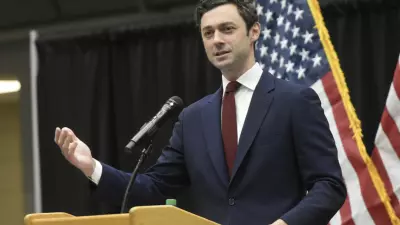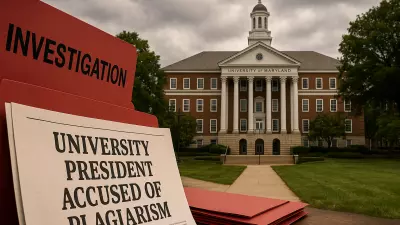Georgia’s 2026 Republican primary won’t be held until next May, but Democratic Sen. Jon Ossoff already knows who he’ll be running against: Donald Trump.

“Trump promised to attack a broken system. I get it: Ripe target,” Ossoff told a campaign crowd last week in Savannah. “But here’s the thing: He’s a crook, and a con man. And he wants to be a king.”
Way back in 2017, in his first congressional race, Ossoff failed to take on Trump directly and lost. It appears he won’t make that mistake again.
“Our fight is against deeply entrenched corruption and greed,” he told the crowd. “Corruption and greed that have so deeply rotted our system that it gave rise to this depraved man who has now plagued our public life for a decade.”
Georgia Republicans seem equally avid to make Trump the central issue of the 2026 midterms. The handful of declared and undeclared candidates for the GOP Senate nomination are unanimous in expressing their bottomless, unconditional loyalty to Trump, as they have to be. Anything Trump wants, they want. If he wants something entirely different tomorrow, tomorrow they will want that too.
And if they don’t see Trump as our king, they certainly aren’t going to say so right out loud, where people might hear them. It’s a mark of how far we’ve fallen that the act of saying “We’re Americans, and we don’t like kings” has become a partisan statement that half the candidates dare not utter for fear of angering their voters.
Even in state and local races, Trump and his policies are going to dominate the upcoming campaign season, in large part because of the passage of what Trump calls his “big, beautiful bill.” The scope and reach of that legislation are enormous, creating significant challenges for the Georgia economy and Georgia’s political leadership.
For example, the $1 trillion in cuts that the bill makes in Medicaid will, in time, strip health insurance from hundreds of thousands of Georgians, many of them living in rural areas of the state where hospitals, doctors and other health care providers are already having a tough time hanging on. Private insurance is scarce in those areas, and if government isn’t paying the health care bills, no one will and providers will disappear.
And if Congress also refuses to extend health insurance subsidies under the Affordable Care Act by the end of the year, as seems likely, hundreds of thousands of additional Georgians will fall off the rolls of the insured, all to help finance major tax cuts for the wealthy.
Will Georgia be OK?
The state of Georgia, with an estimated $15 billion in reserves, could help soften that blow. However, a Republican state leadership that has long refused to expand Medicaid, making Georgia one of only 10 states that still do so, isn’t likely to undergo some sudden change of heart to help less affluent constituents stay insured. That could become a major issue in next year’s campaign, from state legislative races to the competition for governor.
Trump’s “big, beautiful bill” also slashes support for electric vehicles and other renewable energy projects, with experts warning that it will raise utility bills in Georgia. Eventually, it will end up surrendering U.S. leadership in alternative energy development to China and other nations.
If fully implemented, that could undo the legacy that Gov. Brian Kemp had been attempting to build. During his two terms as governor, Kemp has spent much of his time and energy trying to transform Georgia into what he calls the capitol of electricity-driven transportation, not just for the nation but for the world.
As a result of Trump’s legislation, however, a lot of those investments are not going to happen, and billion-dollar investments in battery plants and other infrastructure that are already in the ground here in Georgia, producing good-paying jobs, will have a much harder time staying afloat. (Trump’s chaotic tariffs and trade policy could compound the economic impact on Georgia, a state heavily invested in the logistics industry.)
Under another provision of that bill, Immigration and Customs Enforcement, or ICE, is given an additional $75 billion, which will allow it to more than double the number of agents it can put on the streets, from the current 6,000 to 16,000. The clear intention of the Trump regime is to greatly accelerate the pace of immigration raids, with immense consequences for the carpet industries of north Georgia, the construction and service industries of metro Atlanta and the agriculture industry of south Georgia.
As we’ve all witnessed, ICE has not exactly comported itself with reason, moderation or humanity in its mass deportation effort, and much of the Republican base is fine with that and wants even more.
It’s hard to exert discipline or restraint on an agency that operates behind masks, which means no agents can be held accountable for their excesses and mistakes. In fact, no federal law-enforcement agency has ever behaved in such fashion in our nation’s history.
As Ossoff noted in his Savannah speech, “Donald Trump wants the whole country to fear,” and the president is getting his wish.
“I’ve heard it from people at every level, including people with power, people with status, people with resources,” Ossoff said. “They come to my office, and they tell me they’re afraid to say anything. They’re afraid of retribution, investigation, destruction, vengeance from their own government.”
That’s not my America. Is it your America?







